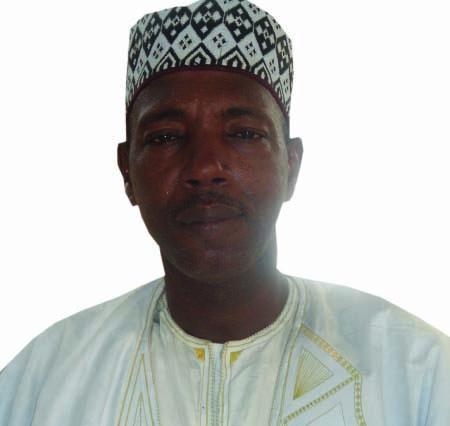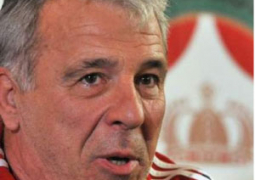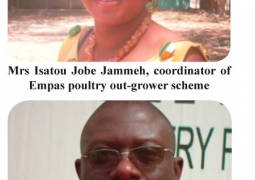
Hon. Hamat Bah leader of the opposition National Reconciliation Party, NRP, called a press conference Saturday, and gave his reaction to President Yahya Jammeh’s recent edict forbidding Muslims in the country performing the Eid prayer last Tuesday.
Hamat Bah variously described the President’s action as “wrong”, “against the constitution of this Republic”, “a serious error of judgment”, as “unacceptable”, that “it is against the law”, and as “a monumental error”.
The NRP leader said he called the press conference, held at the party’s headquarters at Kairaba Avenue, to respond to requests from media houses to comment on various topical and burning issues.
He said he would start with issues of concern to most Gambians, and to make known the views of the opposition.
it is normal, he went on, that in any democracy, that when the government makes statements or takes certain decisions, it is important that the opposition also reacts, to tell the public their view on what has been said or done.
Further explaining what he believes should happen in a normal democracy, Hamat Bah declared: “Nothing will stop us speaking our mind; we’ll always speak our mind, come what may; because that is our job; that is what we have chosen; the profession we have decided to take, to be politicians, and we happen to be opposition politicians.
“Therefore, it only fair that when a statement is made, that we react to that statement, so that the public will know there are different views to the views expressed or the position taken.
“Let me start with the recent Koriteh, that we have just celebrated. I’m sure some of you must have been surprised by the utterances vis a vis the issue of people praying on the same day.
“Where threats were issued that people within the administrative areas of Brikama, KMC and Banjul, if they prayed on a day apart from the Monday when the Imam Ratib of Banjul prayed, would face arrest.
“I felt really, it is important that we react to that statement” According to the Gambian opposition leader, the country’s 1997 constitution in section 25 clearly spelt out guarantees for “freedom of conscience, of religion, right to worship the God you believe in”.
“So for anybody; the chief executive of the country, to issue a statement like that, forcing people to pray on a date they don’t agree with is wrong. It is against the constitution of this Republic.
“Therefore, we felt that was a serious error of judgment.
“I think that the President should understand that the supreme law of the land is what put him where he is; that the law needs to be respected, that is, the constitution.”
Hamat Bah recalled that there was a case of one Serigne Ndigal Modou Habib Secka, in Upper Saloum district (in the Central River Region) around 2002. Secka was accused of worshipping his own god; of calling himself god.
He said the man was detained, subsequently taken to court, and “we took a lawyer for him; senior advocate Antouman Gaye represented him in that court case. And indeed he won the case.
“The state lost the case. The high court of The Gambia reaffirmed the right of the man to worship whatever he wants to worship, and to believe in anything he wants to believe. So Seringe Modou Ndigal was released; was acquitted and discharged in that court case.
“So for me, I cannot understand [that] the supreme custodian of the constitution, can order people to be arrested because they want to pray on a different day. That is unacceptable; it is against the law!”
He spoke of “the approach”.
“I think really, the issue of people praying in one day, should not be politicized, be taken at the level of government. I think there is need for a dialogue to educate people”
Bah added that praying with Maccah should be a matter of choice. “You don’t have to impose it on people!”
He continued: “If they had taken the right approach, we would not have this problem…The approach they are taking I want to question seriously. I think that is not the way; forcing people is not the solution”.
Hamat Bah went on to state that allowing the people in the provinces to pray on Tuesday without hindrance, and denying this right to people in the Greater Banjul and Brikama administrative region tantamount to “segregating, discriminating”.
“You shouldn’t have stopped anybody from praying; everybody who wants to pray, let them pray; even if they want to pray on Wednesday, it’s their business.
“What is clear is that you have prayed yourself; and that is what you have done; it’s between you and God. I think really, to be honest with you, that was a monumental error. It was wrong to force people not to pray, when they want to pray”.
He went on to point out that “if we want to unify the issue of praying on the same day, we will have a problem, because we as Muslims have different sects, Tijaniyya, Mourides, Qadriyya and some who believe in something else”.
“And we must be very careful, particularly in this part of Africa; particularly in peaceful countries where people of different religions have co-existed in peace and harmony; particularly in countries like The Gambia.”
He warned of a growing Islamic fundamentalism in the country…“You don’t have to impose your ideology on people; by using your position, to impose yourself on people. That is wrong; that is, for anybody to do that.
“We must make sure that whatever we do, we do it within the law. Because I have a right to pray…We have to be very careful so that we maintain the peace…
“If I am President, I will not let any individual or group of individuals, organization or association to use me to further their agenda and set me against my people”.



